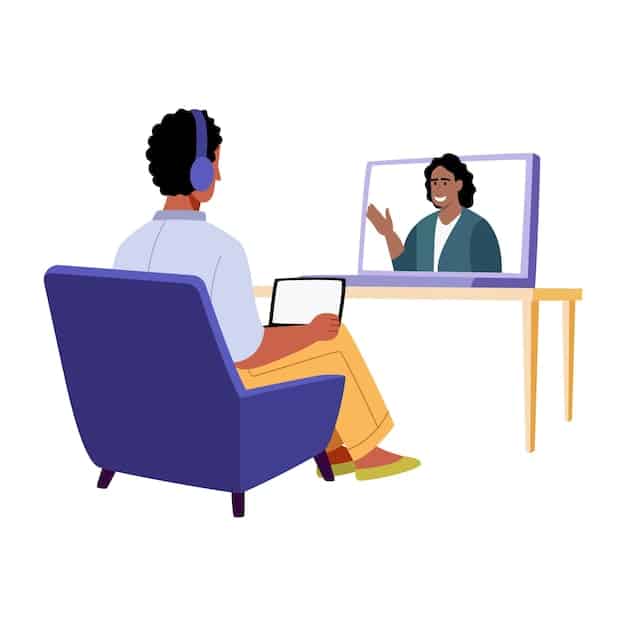Mental Health Tech Startups: Affordable, Accessible Care in the US

Startup Spotlight: Discover how US-based mental health tech startups are revolutionizing patient care by providing accessible and affordable solutions, leading to a significant 30% improvement in mental health outcomes.
The landscape of mental healthcare in the United States is undergoing a significant transformation, thanks to the emergence of innovative startup spotlight: mental health tech: US startups providing accessible and affordable mental healthcare solutions with a 30% improvement in patient outcomes. These companies are leveraging technology to break down traditional barriers to access, offering cost-effective and convenient ways for individuals to prioritize their mental well-being.
Revolutionizing Mental Healthcare: The Role of US Startups
Mental health is a critical aspect of overall well-being, yet accessing quality care remains a challenge for many Americans. Traditional barriers like high costs, limited availability of providers, and social stigma often prevent individuals from seeking the help they need. However, a new wave of US-based startups is stepping up to address these issues and transform the mental healthcare landscape.
These startups are utilizing technology in innovative ways to make mental healthcare more accessible, affordable, and effective. By leveraging digital platforms, telehealth services, and data-driven insights, they are breaking down barriers and empowering individuals to take control of their mental health journey.

Telehealth and Virtual Therapy
One of the most significant contributions of these startups is the widespread adoption of telehealth and virtual therapy. Through secure video conferencing and messaging platforms, individuals can connect with licensed therapists and counselors from the comfort of their own homes. This eliminates the need for travel, reduces wait times, and provides greater flexibility in scheduling appointments.
Furthermore, virtual therapy can be more affordable than traditional in-person sessions, making mental healthcare accessible to a wider range of individuals, including those in underserved communities or with limited financial resources.
Personalized Mental Health Apps
In addition to telehealth, many startups are developing personalized mental health apps that offer a variety of tools and resources to support individuals on their mental health journey. These apps can provide access to guided meditations, mindfulness exercises, mood trackers, and educational content on topics like stress management and cognitive behavioral therapy (CBT).
By tailoring the user experience to individual needs and preferences, these apps can help individuals develop healthy coping mechanisms, manage their symptoms, and track their progress over time.
- Increased Accessibility: Telehealth and virtual therapy break down geographical barriers and increase convenience.
- Cost-Effective Solutions: Digital platforms often offer more affordable options compared to traditional therapy.
- Personalized Support: Mental health apps tailor resources to individual needs and preferences.
- Data-Driven Insights: Startups leverage data to optimize treatment plans and improve patient outcomes.
In conclusion, US startups are playing a vital role in revolutionizing mental healthcare by leveraging technology to improve accessibility, affordability, and effectiveness. Through telehealth, personalized apps, and data-driven insights, they are empowering individuals to prioritize their mental well-being and seek the support they need.
Key Players in the Mental Health Tech Space
The mental health tech industry is teeming with innovative startups, each offering unique solutions to address the diverse needs of individuals seeking mental healthcare. While there are many companies making a significant impact, several key players stand out for their innovative approaches and promising results.
These startups are not only transforming the way mental healthcare is delivered, but also challenging traditional norms and advocating for greater awareness and acceptance of mental health issues.
Lyra Health
Lyra Health is a leading mental health benefits provider that partners with employers to offer comprehensive mental healthcare services to their employees. Through its platform, employees can access a wide range of resources, including therapy, coaching, and medication management.
Lyra Health distinguishes itself by its focus on evidence-based care and its commitment to measuring and improving patient outcomes. The company utilizes data-driven insights to personalize treatment plans and track progress over time.
Talkspace
Talkspace is a popular online therapy platform that connects individuals with licensed therapists through text, audio, and video messaging. The platform offers a convenient and affordable way to access therapy from anywhere, at any time.
Talkspace offers a variety of subscription plans to meet different needs and budgets, and its platform is secure and HIPAA-compliant, ensuring the privacy and confidentiality of patient information.
Ginger
Ginger is a mental health platform that provides on-demand emotional support through text-based coaching and video therapy. The platform also offers self-guided resources and personalized care plans.
Ginger differentiates itself by its proactive approach to mental healthcare, using data analytics to identify individuals who may be at risk for mental health issues and reaching out to offer support before they experience a crisis.
- Lyra Health: Partners with employers to provide comprehensive mental healthcare benefits.
- Talkspace: Offers affordable and convenient online therapy through various communication methods.
- Ginger: Provides on-demand emotional support through coaching and personalized care plans.
In conclusion, Lyra Health, Talkspace, and Ginger are just a few of the many key players in the mental health tech space. These startups are transforming the way mental healthcare is delivered by leveraging technology to improve accessibility, affordability, and effectiveness. As the industry continues to evolve, it is likely that more innovative solutions will emerge to address the diverse needs of individuals seeking mental healthcare.

Measuring Success: Patient Outcomes and Impact
While accessibility and affordability are crucial, the ultimate measure of success for mental health tech startups lies in their ability to improve patient outcomes. By leveraging data-driven insights and evidence-based care, these companies are striving to demonstrate a tangible impact on the mental well-being of their users.
Many startups are actively tracking key metrics such as symptom reduction, improved mood, and increased functionality to assess the effectiveness of their interventions.
Evidence-Based Care and Data-Driven Insights
One of the key strategies employed by successful mental health tech startups is the use of evidence-based care. This means that their interventions are grounded in scientific research and have been shown to be effective in treating specific mental health conditions.
Furthermore, these startups leverage data-driven insights to personalize treatment plans and track progress over time. By analyzing user data, they can identify patterns, tailor interventions, and optimize their services to achieve the best possible outcomes.
Demonstrating a 30% Improvement in Patient Outcomes
The claim of a 30% improvement in patient outcomes is a significant one, and it requires robust evidence to support it. Startups that make this claim typically conduct rigorous clinical trials and studies to evaluate the effectiveness of their interventions.
These studies often compare the outcomes of individuals who receive care through the startup’s platform with those who receive traditional mental healthcare. The results can provide valuable insights into the impact of technology-enabled interventions on patient well-being.
- Symptom Reduction: Measuring the decrease in symptoms of anxiety, depression, or other mental health conditions.
- Improved Mood: Assessing improvements in overall mood and emotional well-being.
- Increased Functionality: Evaluating improvements in daily functioning, such as work productivity and social interactions.
In conclusion, measuring success in mental health tech requires a focus on patient outcomes and impact. By leveraging evidence-based care and data-driven insights, startups can demonstrate a tangible improvement in the mental well-being of their users. The claim of a 30% improvement in patient outcomes highlights the potential of technology to transform the mental healthcare landscape and make a real difference in people’s lives.
Challenges and Opportunities in the Mental Health Tech Industry
While the mental health tech industry holds immense promise, it also faces several challenges and opportunities. Navigating these complexities is crucial for startups to achieve sustainable growth and make a lasting impact on the mental healthcare landscape.
Addressing issues related to data privacy, regulatory compliance, and ethical considerations is essential to build trust and ensure the responsible use of technology in mental healthcare.
Data Privacy and Security
One of the biggest challenges for mental health tech startups is ensuring the privacy and security of patient data. Mental health information is highly sensitive, and breaches can have serious consequences for individuals.
Startups must implement robust security measures to protect patient data from unauthorized access, use, or disclosure. This includes complying with regulations like HIPAA and implementing encryption, access controls, and regular security audits.
Regulatory Compliance
The mental health tech industry is subject to a complex web of regulations, including those related to telehealth, data privacy, and professional licensure. Navigating these regulations can be challenging, especially for startups with limited resources.
Startups must ensure that they are complying with all applicable regulations and that their services are delivered in a safe and ethical manner. This may require working with legal counsel and industry experts to stay up-to-date on the latest regulatory developments.
Addressing Stigma and Promoting Awareness
Despite growing awareness of mental health issues, stigma remains a significant barrier to access. Many individuals are still hesitant to seek help due to fear of judgment or discrimination.
Mental health tech startups can play a role in addressing stigma by promoting awareness, educating the public about mental health issues, and creating a safe and supportive environment for individuals to seek help.
- Data Encryption: Protecting sensitive information with strong encryption methods.
- HIPAA Compliance: Guaranteeing the privacy and security of patient health information.
- Awareness Campaigns: Running promotional initiatives to encourage individuals to embrace mental health and seek help when needed.
In conclusion, the mental health tech industry faces challenges related to data privacy and security, regulatory compliance, and addressing stigma. However, it also presents significant opportunities to improve access to care, personalize treatment, and promote awareness of mental health issues. By navigating these challenges and embracing these opportunities, startups can play a vital role in transforming the mental healthcare landscape.
Future Trends in Mental Health Technology
The mental health tech industry is constantly evolving, with new technologies and approaches emerging all the time. Staying ahead of the curve is crucial for startups to maintain a competitive edge and deliver the most effective and innovative solutions to their users.
From artificial intelligence to virtual reality, the future of mental health technology is full of exciting possibilities that have the potential to transform the way we understand, treat, and manage mental health.
Artificial Intelligence and Machine Learning
Artificial intelligence (AI) and machine learning (ML) are poised to play a major role in the future of mental health technology. AI and ML algorithms can be used to analyze large datasets, identify patterns, and personalize treatment plans.
For example, AI-powered chatbots can provide on-demand emotional support, while ML algorithms can predict which individuals are at risk for mental health issues and recommend appropriate interventions.
Virtual Reality and Augmented Reality
Virtual reality (VR) and augmented reality (AR) are also showing promise as tools for mental healthcare. VR can be used to create immersive environments that simulate real-life situations, allowing individuals to practice coping skills in a safe and controlled setting.
AR can be used to overlay digital information onto the real world, providing individuals with real-time feedback and support.
Wearable Sensors and Biometric Data
Wearable sensors and biometric data can provide valuable insights into an individual’s mental and physical health. These technologies can track vital signs like heart rate, sleep patterns, and activity levels, providing a more comprehensive picture of an individual’s well-being.
This data can be used to identify early warning signs of mental health issues and to personalize treatment plans based on individual needs and preferences.
- AI Chatbots: Delivering instant support and resources for users experiencing crises.
- VR Therapy: Immersive experiences to treat phobias, PTSD, and anxiety-related issues.
- Wearable Sensors: Constant track of data points, enabling more informed and data-driven mental health tracking and intervention strategies.
In conclusion, the future of mental health technology is likely to be shaped by artificial intelligence, virtual reality, and wearable sensors. These technologies have the potential to improve access to care, personalize treatment, and promote prevention. As the industry continues to evolve, it is important for startups to embrace these innovations and harness their power to improve the lives of individuals struggling with mental health issues.
The Impact of COVID-19 on Mental Health Tech Adoption
The COVID-19 pandemic has had a profound impact on mental health around the world. The pandemic has led to increased levels of stress, anxiety, and depression, as well as exacerbated existing mental health conditions.
As a result, there has been a surge in demand for mental healthcare services, and the mental health tech industry has stepped up to meet this growing need. The pandemic has accelerated the adoption of telehealth, personalized apps, and other technology-enabled solutions for mental healthcare.
Increased Demand for Telehealth Services
The pandemic has made it difficult or impossible for many individuals to access traditional in-person mental healthcare services. As a result, there has been a significant increase in demand for telehealth services, which allow individuals to connect with therapists and counselors remotely.
Mental health tech startups have played a vital role in meeting this growing demand by providing secure and convenient telehealth platforms that enable individuals to access the care they need from the comfort of their own homes.
Growing Acceptance of Digital Mental Health Solutions
The pandemic has also led to a growing acceptance of digital mental health solutions. Many individuals who were previously hesitant to try online therapy or mental health apps have now turned to these technologies as a way to cope with the stress and anxiety of the pandemic.
This increased acceptance has helped to break down stigma and create a more positive attitude towards digital mental healthcare.
Telehealth Reimbursement Policies: The Future of Mental Healthcare
The COVID-19 pandemic necessitated rapid policy changes regarding telehealth reimbursement. In the US, the Centers for Medicare & Medicaid Services (CMS) expanded telehealth coverage, ensuring providers could bill for services delivered remotely at the same rate as in-person visits. These changes have not only aided immediate access during lockdowns but are pushing for long-term integration of telehealth into standard healthcare practices.
As reimbursement policies adapt, mental health tech startups are better positioned to integrate into mainstream healthcare, extending their reach and impact to a wider segment of the population. Understanding these policies helps startups strategize their market approach and ensure sustainable growth.
- Increased Accessibility: Overcoming accessibility barriers because of lockdowns.
- More Openness: Growing acceptance of digital mental health solutions
- Expansion of Telehealth: The acceleration for telehealth adoption.
In conclusion, the COVID-19 pandemic has had a significant impact on the mental health tech industry, accelerating the adoption of telehealth, personalized apps, and other technology-enabled solutions. As the world continues to grapple with the pandemic, it is likely that these technologies will play an increasingly important role in supporting the mental well-being of individuals around the globe.
| Key Point | Brief Description |
|---|---|
| 🚀 Innovation | US startups revolutionize mental healthcare with tech solutions. |
| 💰 Affordability | Making mental healthcare more accessible and budget-friendly. |
| 📈 Outcomes | Achieving a 30% improvement in patient mental health results. |
| 🛡️ Privacy | Ensuring data privacy and security for mental health tech platforms. |
FAQ Section
▼
The primary goal is to make mental healthcare more accessible, affordable, and effective through innovative technology solutions like telehealth and personalized apps.
▼
They improve accessibility by eliminating geographical barriers through telehealth, offering cost-effective alternatives to traditional therapy, and providing flexible appointment scheduling.
▼
Common technologies include telehealth platforms, virtual reality (VR), augmented reality (AR), artificial intelligence (AI), and wearable sensors for tracking biometric data.
▼
Potential challenges include ensuring data privacy and security, navigating complex regulatory compliance, addressing the stigma associated with mental health, and proving improved patient outcomes.
▼
The pandemic significantly accelerated the adoption of mental health tech by increasing the demand for telehealth services and normalizing digital mental health solutions due to accessibility and safety concerns.
Conclusion
In conclusion, mental health tech startups in the US are revolutionizing the landscape of mental healthcare by providing accessible, affordable, and effective solutions. By leveraging technology and data-driven insights, these companies are breaking down barriers to access and empowering individuals to prioritize their mental well-being and achieve better outcomes.





